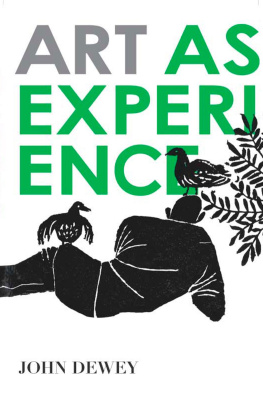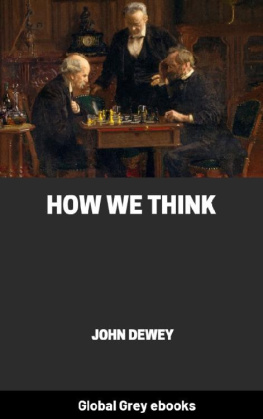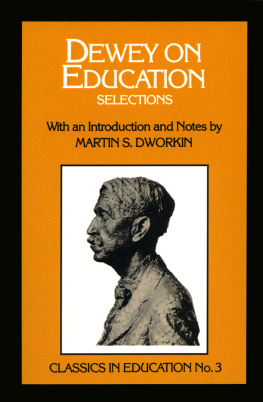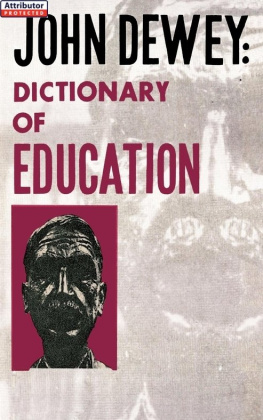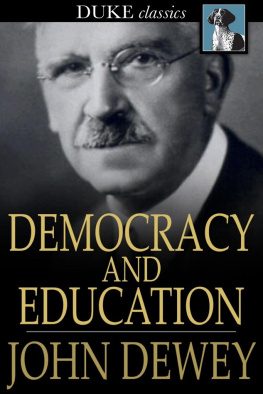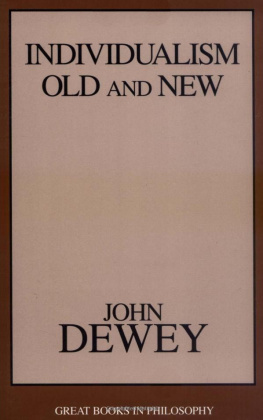Dewey John - Moral Principles in Education
Here you can read online Dewey John - Moral Principles in Education full text of the book (entire story) in english for free. Download pdf and epub, get meaning, cover and reviews about this ebook. genre: Science. Description of the work, (preface) as well as reviews are available. Best literature library LitArk.com created for fans of good reading and offers a wide selection of genres:
Romance novel
Science fiction
Adventure
Detective
Science
History
Home and family
Prose
Art
Politics
Computer
Non-fiction
Religion
Business
Children
Humor
Choose a favorite category and find really read worthwhile books. Enjoy immersion in the world of imagination, feel the emotions of the characters or learn something new for yourself, make an fascinating discovery.
- Book:Moral Principles in Education
- Author:
- Genre:
- Rating:5 / 5
- Favourites:Add to favourites
- Your mark:
- 100
- 1
- 2
- 3
- 4
- 5
Moral Principles in Education: summary, description and annotation
We offer to read an annotation, description, summary or preface (depends on what the author of the book "Moral Principles in Education" wrote himself). If you haven't found the necessary information about the book — write in the comments, we will try to find it.
Moral Principles in Education — read online for free the complete book (whole text) full work
Below is the text of the book, divided by pages. System saving the place of the last page read, allows you to conveniently read the book "Moral Principles in Education" online for free, without having to search again every time where you left off. Put a bookmark, and you can go to the page where you finished reading at any time.
Font size:
Interval:
Bookmark:
The Project Gutenberg EBook of Moral Principles in Education, by John Dewey
This eBook is for the use of anyone anywhere at no cost and with
almost no restrictions whatsoever. You may copy it, give it away or
re-use it under the terms of the Project Gutenberg License included
with this eBook or online at www.gutenberg.net
Title: Moral Principles in Education
Author: John Dewey
Release Date: April 25, 2008 [EBook #25172]
Language: English
*** START OF THIS PROJECT GUTENBERG EBOOK MORAL PRINCIPLES IN EDUCATION ***
Produced by Barbara Tozier, Bill Tozier and the Online
Distributed Proofreading Team at http://www.pgdp.net
Riverside Educational Monographs
EDITED BY HENRY SUZZALLO
SOMETIME PROFESSOR OF THE PHILOSOPHY OF EDUCATION TEACHERS COLLEGE, COLUMBIA UNIVERSITY, AND PRESIDENT OF THE UNIVERSITY OF WASHINGTON
BY
JOHN DEWEY
PROFESSOR OF PHILOSOPHY IN COLUMBIA UNIVERSITY
Pub Device
HOUGHTON MIFFLIN COMPANY
BOSTON NEW YORK CHICAGO DALLAS
SAN FRANCISCO
The Riverside Press Cambridge
COPYRIGHT, 1909, BY JOHN DEWEY
ALL RIGHTS RESERVED
The author has drawn freely upon his essay on Ethical Principles Underlying Education, published in the Third Year-Book of The National Herbart Society for the Study of Education. He is indebted to the Society for permission to use this material.
The Riverside Press
CAMBRIDGE, MASSACHUSETTS
PRINTED IN THE U.S.A.
- Introduction
- The Moral Purpose of the School
- The Moral Training Given by the School Community
- The Moral Training from Methods of Instruction
- The Social Nature of the Course of Study
- The Psychological Aspect of Moral Education
- Outline
Contents
It is one of the complaints of the schoolmaster that the public does not defer to his professional opinion as completely as it does to that of practitioners in other professions. At first sight it might seem as though this indicated a defect either in the public or in the profession; and yet a wider view of the situation would suggest that such a conclusion is not a necessary one. The relations of education to the public are different from those of any other professional work. Education is a public business with us, in a sense that the protection and restoration of personal health or legal rights are not. To an extent characteristic of no other institution, save that of the state itself, the school has power to modify the social order. And under our political system, it is the right of each individual to have a voice in the making of social policies as, indeed, he has a vote in the determination of political affairs. If this be true, education is primarily a public business, and only secondarily a specialized vocation. The layman, then, will always have his right to some utterance on the operation of the public schools.
I have said some utterance, but not all; for school-mastering has its own special mysteries, its own knowledge and skill into which the untrained layman cannot penetrate. We are just beginning to recognize that the school and the government have a common problem in this respect. Education and politics are two functions fundamentally controlled by public opinion. Yet the conspicuous lack of efficiency and economy in the school and in the state has quickened our recognition of a larger need for expert service. But just where shall public opinion justly express itself, and what shall properly be left to expert judgment?
In so far as broad policies and ultimate ends affecting the welfare of all are to be determined, the public may well claim its right to settle issues by the vote or voice of majorities. But the selection and prosecution of the detailed ways and means by which the public will is to be executed efficiently must remain largely a matter of specialized and expert service. To the superior knowledge and technique required here, the public may well defer.
In the conduct of the schools, it is well for the citizens to determine the ends proper to them, and it is their privilege to judge of the efficacy of results. Upon questions that concern all the manifold details by which children are to be converted into desirable types of men and women, the expert schoolmaster should be authoritative, at least to a degree commensurate with his superior knowledge of this very complex problem. The administration of the schools, the making of the course of study, the selection of texts, the prescription of methods of teaching, these are matters with which the people, or their representatives upon boards of education, cannot deal save with danger of becoming mere meddlers.
Nowhere is the validity of this distinction between education as a public business and education as an expert professional service brought out more clearly than in an analysis of the public discussion of the moral work of the school. How frequently of late have those unacquainted with the special nature of the school proclaimed the moral ends of education and at the same time demanded direct ethical instruction as the particular method by which they were to be realized! This, too, in spite of the fact that those who know best the powers and limitations of instruction as an instrument have repeatedly pointed out the futility of assuming that knowledge of right constitutes a guarantee of right doing. How common it is for those who assert that education is for social efficiency to assume that the school should return to the barren discipline of the traditional formal subjects, reading, writing, and the rest! This, too, regardless of the fact that it has taken a century of educational evolution to make the course of study varied and rich enough to call for those impulses and activities of social life which need training in the child. And how many who speak glowingly of the large services of the public schools to a democracy of free and self-reliant men affect a cynical and even vehement opposition to the self-government of schools! These would not have the children learn to govern themselves and one another, but would have the masters rule them, ignoring the fact that this common practice in childhood may be a foundation for that evil condition in adult society where the citizens are arbitrarily ruled by political bosses.
One need not cite further cases of the incompetence of the lay public to deal with technical questions of school methods. Instances are plentiful to show that well-meaning people, competent enough to judge of the aims and results of school work, make a mistake in insisting upon the prerogative of directing the technical aspects of education with a dogmatism that would not characterize their statements regarding any other special field of knowledge or action.
Nothing can be more useful than for the public and the teaching profession to understand their respective functions. The teacher needs to understand public opinion and the social order, as much as the public needs to comprehend the nature of expert educational service. It will take time to draw the boundary lines that will be conducive to respect, restraint, and efficiency in those concerned; but a beginning can be made upon fundamental matters, and nothing so touches the foundations of our educational thought as a discussion of the moral principles in education.
It is our pleasure to present a treatment of them by a thinker whose vital influence upon the reform of school methods is greater than that of any of his contemporaries. In his discussion of the social and psychological factors in moral education, there is much that will suggest what social opinion should determine, and much that will indicate what must be left to the trained teacher and school official.
Font size:
Interval:
Bookmark:
Similar books «Moral Principles in Education»
Look at similar books to Moral Principles in Education. We have selected literature similar in name and meaning in the hope of providing readers with more options to find new, interesting, not yet read works.
Discussion, reviews of the book Moral Principles in Education and just readers' own opinions. Leave your comments, write what you think about the work, its meaning or the main characters. Specify what exactly you liked and what you didn't like, and why you think so.




